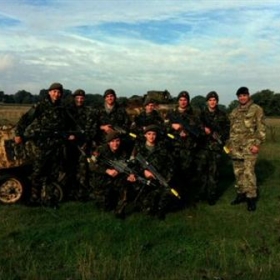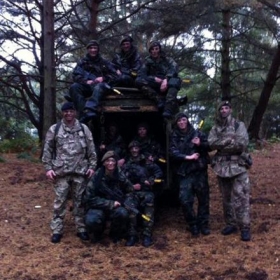Oundle cadets triumph at Exercise Anglian Cadet Competition
Published on isbi School News dated Tuesday 29th of October 2013
Over the first weekend of the October break, eight of Oundle School's finest Army Cadets made the trek down to the STANTA training area in Thetford Forest for a military competition run by 3rd Battalion The Royal Anglian Regiment. They were up against 11 cadet teams from all over the UK; victory was going to be a tough challenge!Sergeant Major, Mike Williams commented, 'Arriving late on Friday night we slept on a large hangar floor and awoke to the sound of heavy rain - ideal conditions for a challenging day of competition! The Exercise was a great opportunity to learn about the weapons, tactics and equipment used by the British Army, but seldom seen in the cadet world.'
Corporal Mac McLatchey, an experienced Section Commander was attached to Oundle's section. He came equipped not only with grenades and a radio, but also a wealth of knowledge gained from 20 years in the Army. After travelling to the training area in a massive MAN Troop Carrying Vehicle, the very first activity of the day was an introduction to the General Purpose Machine Gun, Light Machine Gun, Light Support Weapon and an Underslung Grenade Launcher - all weapons in current service in Afghanistan.
There were seven activities on the Saturday covering a wide range of the skills required in the CCF, ranging from stealthy Camouflage and Concealment, to Command Tasks and Target Indication. Oundle's Section scored very highly in all the activities putting them in good stead for the last two elements of the competition the following day.
Sergeant Williams continued, 'That night, despite the torrential rain and gale force winds, we completed a successful ambush where no less than 2500 rounds were fired off by fewer than 50 cadets. However, as dawn broke on Sunday morning and as the Commanding Officer of the Exercise put it, 'the glorious dawn attack' loomed, our Oundle Section came into its own.
Of the all schools and ACF contingents present it became clear that the Oundle Section were up for the challenge of closing with our opposing red forces during the final attack. Our aggression and physical fitness, combined with our tactical understanding of how to assault the enemy positions, meant that we blew the competition out of the water.'
At the final parade, Oundle were announced as the winners of the 2 day competition.
CCF Contingent Commander, Andrew Mansergh concluded, 'Praise must go to all the cadets who took part and won, but in particular to Fifth former Tristan Tusa, who, although being two years younger than anyone else in our team, coped admirably. Colour Sergeants James Williamson and Charlie Dowdeswell, Section Commander and 2IC respectively, lead the team impeccably, and such were the performances of Corporals Ashley Cuthbert and Ben Paice during the final attack phase that they were awarded Field Promotions to Sergeant at the end of the Exercise.Special thanks must go to Sergeant Major Williams, the new Contingent Sergeant Major, who gave up his weekend to take the cadets and for his invaluable experience and support.'
Oundle's winning team comprised:
Colour Sergeant James Williamson (Section Commander)
Colour Sergeant Charlie Dowdeswell (2IC)
Sergeant William Barrell
Sergeant Alex Johnsen
Sergeant James Higginbotham
Formerly Corporal and now Sergeant Ashley Cuthbert
Formerly Corporal and now Sergeant Ben Paice
Cadet Tristan Tusa
Oundle's Combined Cadet Force (CCF)
Contingent Commander: Major A.C. Mansergh Royal Marines
The Cadet Force is the largest single organisation in the School; numbering 460 cadets out of an eligible pool of 820 pupils. Eighteen members of staff provide a varied and exciting training programme every Wednesday afternoon during the term. Additional staff assist during the field weekends and holiday periods. Success and recognition is achieved at national levels; in both 2010 and 2011 a senior cadet was the runner up in The Duke of Westminster Award. Drawn from the country's best 200 cadets this annual competition is run to find the top cadets. Oundle has produced three finalists in the last four years.
The CCF comprises of three sections: the Army Section, the Royal Navy Section and the RAF section, and is compulsory for all pupils for one year only (in the Fourth Form or Year 10). All three sections have a common core of Drill, Turnout and Skill at Arms. The RN Section then specialises in rowing, sailing and power boating, the Army Section in infantry skills and tactics, and the RAF Section in flight training. At the end of their Fourth Form year cadets may leave or decide to stay in the CCF and enter one of the specialist training sections: Advanced Infantry; NCO training within the Services; Fire and Rescue (the unit trains on its own fire engine); Adventure Training; and Diving.
Training takes place every Wednesday afternoon with two field weekends, one in September and one in April. In addition, every cadet will undertake at least one camp during School holidays. These camps include skiing in the Alps, diving in the Red Sea, climbing in the Alps and Scottish Highlands, as well as military camps organised by the RAF and Army.
The Oundle School Corps dates back to 1902, as the 'Rifle Corps' 1st (Volunteer) Battalion the Northamptonshire Regiment. Since 1958, the Cadet Corps at Oundle has continuously maintained all three Service sections (Army, Royal Navy and Royal Air Force). Cadets are able to attend the many national camps and courses available to them, some of which are aimed towards gaining qualifications (e.g. power-boating and first aid) whilst others are aimed at developing leadership and teamwork skills.







